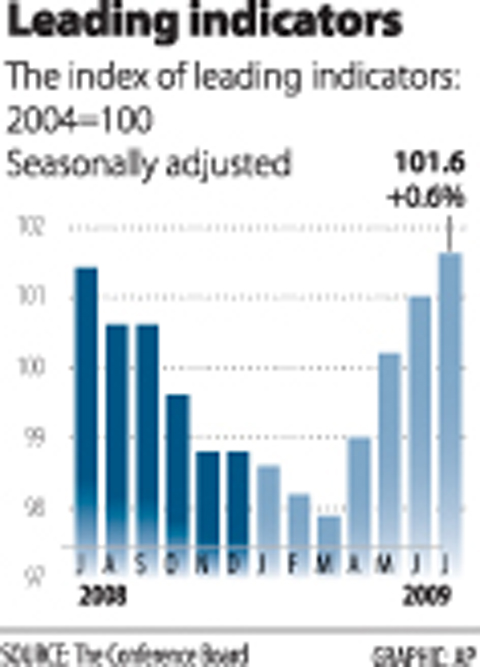Asian currencies declined for a second week, led by South Korea’s won and the Indian rupee, on concern tighter credit in China will curb spending in the world’s fastest-growing major economy.
The Bloomberg-JPMorgan Asia Dollar Index, which tracks Asia’s 10 most-used currencies excluding the yen, this week reached its lowest level in a month as the Shanghai Composite Index of shares dropped 2.8 percent.
The won dropped 0.9 percent from the end of last week to 1,249.85 per dollar in Seoul, according to data compiled by Bloomberg. The rupee lost 0.7 percent to 48.605 and the Indonesian rupiah slid 0.6 percent to 10,015.

The New Taiwan dollar rose 0.2 percent on Friday to NT$32.906 after second-quarter GDP figures showed Taiwan is recovering from a recession. The economy contracted 7.5 percent from a year earlier, less than the 10.1 percent recorded for the first quarter and the 7.8 percent forecast by economists in a Bloomberg survey. The NT dollar was little changed this week.
The Philippine peso was little changed in offshore trading as local markets were shut for a holiday on Friday. The currency slumped 0.8 percent this week, the most in two months, after the government on Wednesday reported a budget deficit of 188 billion pesos (US$3.9 billion) for the last seven months, equivalent to 75 percent of its full-year projection.
Elsewhere, Thailand’s baht was little changed for the week at 34.01 per US dollar and the Chinese yuan was at 6.8312, having barely moved from 6.8342 last Friday. Malaysia’s ringgit gained 0.1 percent to 3.5125.
The US dollar and yen fell against the majority of their most-traded counterparts as US housing and manufacturing reports signaled that the economy is recovering from recession, easing demand for the currencies as a refuge.
The euro also rose on the week against the dollar and yen as German services and French manufacturing unexpectedly expanded this month.
The greenback slumped 0.9 percent to US$1.4326 per euro on Friday from US$1.4203 on Aug. 14, while also dropping more than 1 percent against the South African rand, Swedish krona, Canadian dollar and Swiss franc. The yen fell 0.3 percent to ¥135.21 per euro, from ¥134.84 last week. Japan’s currency also declined versus the rand, krona and franc. The dollar fell 0.6 percent this week to ¥94.38.
The Federal Reserve Bank of Philadelphia’s general economic index climbed to 4.2 from minus 7.5 last month, the bank said on Thursday. Positive readings signal an expansion. The leading US economic indicators rose last month for a fourth consecutive month, the Conference Board reported separately the same day.

WAITING GAME: The US has so far only offered a ‘best rate tariff,’ which officials assume is about 15 percent, the same as Japan, a person familiar with the matter said Taiwan and the US have completed “technical consultations” regarding tariffs and a finalized rate is expected to be released soon, Executive Yuan spokeswoman Michelle Lee (李慧芝) told a news conference yesterday, as a 90-day pause on US President Donald Trump’s “reciprocal” tariffs is set to expire today. The two countries have reached a “certain degree of consensus” on issues such as tariffs, nontariff trade barriers, trade facilitation, supply chain resilience and economic security, Lee said. They also discussed opportunities for cooperation, investment and procurement, she said. A joint statement is still being negotiated and would be released once the US government has made

‘CRUDE’: The potential countermeasure is in response to South Africa renaming Taiwan’s representative offices and the insistence that it move out of Pretoria Taiwan is considering banning exports of semiconductors to South Africa after the latter unilaterally downgraded and changed the names of Taiwan’s two representative offices, the Ministry of Foreign Affairs (MOFA) said yesterday. On Monday last week, the South African Department of International Relations and Cooperation unilaterally released a statement saying that, as of April 1, the Taipei Liaison Offices in Pretoria and Cape Town had been renamed the “Taipei Commercial Office in Johannesburg” and the “Taipei Commercial Office in Cape Town.” Citing UN General Assembly Resolution 2758, it said that South Africa “recognizes the People’s Republic of China (PRC) as the sole

NEW GEAR: On top of the new Tien Kung IV air defense missiles, the military is expected to place orders for a new combat vehicle next year for delivery in 2028 Mass production of Tien Kung IV (Sky Bow IV) missiles is expected to start next year, with plans to order 122 pods, the Ministry of National Defense’s (MND) latest list of regulated military material showed. The document said that the armed forces would obtain 46 pods of the air defense missiles next year and 76 pods the year after that. The Tien Kung IV is designed to intercept cruise missiles and ballistic missiles to an altitude of 70km, compared with the 60km maximum altitude achieved by the Missile Segment Enhancement variant of PAC-3 systems. A defense source said yesterday that the number of

Taiwanese exports to the US are to be subject to a 20 percent tariff starting on Thursday next week, according to an executive order signed by US President Donald Trump yesterday. The 20 percent levy was the same as the tariffs imposed on Vietnam, Sri Lanka and Bangladesh by Trump. It was higher than the tariffs imposed on Japan, South Korea and the EU (15 percent), as well as those on the Philippines (19 percent). A Taiwan official with knowledge of the matter said it is a "phased" tariff rate, and negotiations would continue. "Once negotiations conclude, Taiwan will obtain a better